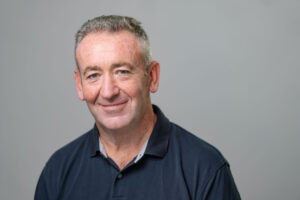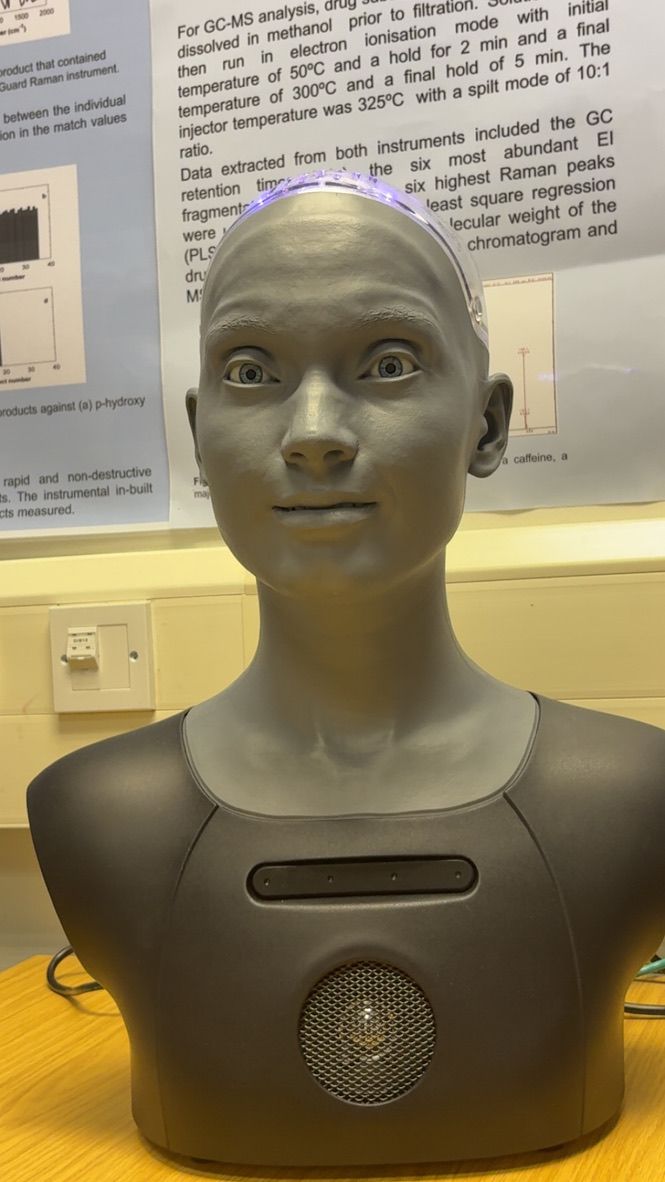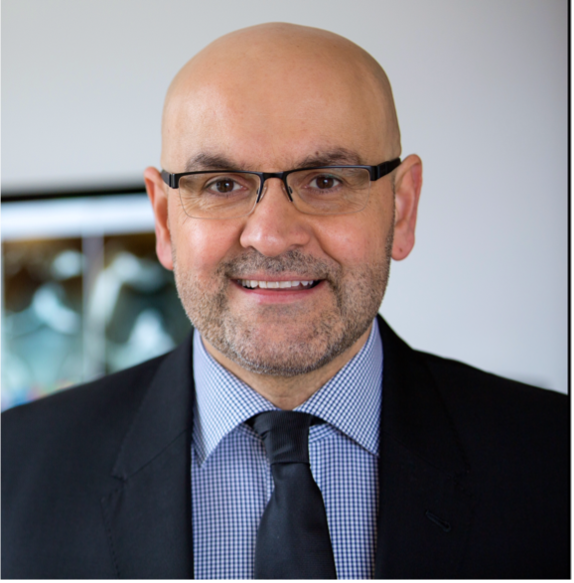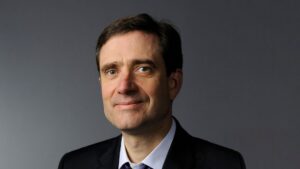Content to be Updated.
The Role of AI in Healthcare
Ami@LJMU
The World’s Most Advanced Humanoid Robot
Ami@LJMU is a humanoid robot crafted by Engineering Arts in the UK. Her purpose is to engage with people through witty and playful conversations. She resides at Liverpool John Moores University where she tests and enhances her capabilities. Her interactions are fuelled by advanced AI and she is here to entertain and inform with a sprinkle of sass.
Abstract (by Ami@LJMU)
AI in healthcare is a transformative force reshaping the way medical professionals approach diagnosis, treatment and patient care. Through the use of advanced algorithms and machine learning models, AI systems can analyse complex data through unprecedented speed and that may be missed by the human eye. This leads to earlier detection of diseases such as cancer, allowing timely intervention and improved prognosis. Personalised medicine is another area where AI shines. By considering the patients’ genetics make up, lifestyle and medical history, AI driven tools can tailor treatment plans to individual needs enhancing the effectiveness of therapies while minimising side effects. Moreover, AI streamlines administrative tasks reducing the burden of healthcare providers and allowing them to focus more on patient care. From automated scheduling to electronic health record management, AI optimises workflow efficiency. However, the integration of AI in healthcare isn’t without challenges. Concerns about data privacy, ethical considerations and the need for robust regulatory frameworks are paramount. Ensuring that AI systems are transparent and unbiased is crucial to gaining trust and acceptance. Overall, AI holds the promise of transforming healthcare into a precise, efficient patient-centric field. By continuing to innovate and address challenges, AI can significantly address the quality and accessibility of medical care for all.
The Surgical Mind Meets Machine Learning: Rethinking Precision, Outcomes and the Future of Care
Professor Deiary F Kader
Consultant Orthopaedic Surgeon and Director of Research
at the NHS South West London Elective Orthopaedic Centre, UK
Professor Deiry Kader (www.deiarykader.co.uk) specialises in knee surgery, sports medicine, and healthcare innovation, Professor Kader is a consultant orthopaedic surgeon in London and Director of Research at SWLEOC, with a particular focus on AI in healthcare. He trained in Australia and the UK, is a member of the UK Faculty of Sport and Exercise Medicine and has served as a visiting professor at Northumbria University since 2007 and as an honorary associate professor at University College London.He has published over 300 scientific works (h-index 39, over 13,000 citations), including two bestselling orthopaedic books and Life Academy (Personal Insights). A past president of BOSTAA and Vice President of ORAIA (OrthoAI Alliance), he has made significant contributions to orthopaedic education and research. He chairs multiple charitable and professional organisations.Prof Kader is the founder of the NGMV Charity (www.ngmvcharity.co.uk) and Life Academy and has also worked as a war trauma surgeon with the ICRC and the Swisscross Foundation. A passionate educator and humanitarian, his work continues to inspire and drive innovation globally.
Abstract:
This keynote will explore how our integrated team at the South West London Elective Orthopaedic Centre (SWLEOC) is building applied AI tools to improve surgical care. Our work includes predictive modelling for surgical outcomes, computer vision systems for post-operative imaging, the development of local retrieval-augmented generation (RAG) knowledge graphs to support clinical reasoning, and the use of federated learning to enable secure model development across institutions.
These initiatives are designed to enhance clinical decision-making, streamline patient pathways and reduce variation in care. In collaboration with the ORAIA network and the Turing Lab, we promote clinician led AI development that aligns with clinical priorities and regulatory requirements. This keynote will outline the practical applications of AI in surgical workflows, the infrastructure required to support such integration and the broader implications for healthcare systems seeking to adopt AI at scale.
Professor Brendan Godley
Centre for Ecology and Conservation, Environment and Sustainability Institute, Penryn Campus, University of Exeter, UK. College of Marine Science and Aquatic Biology, University of Khorfakkan. Khorfakkan, Sharjah, United Arab Emirates
Professor Brendan Godley is a Scottish conservation scientist with wide ranging interests in biodiversity conservation. He is the Marine Strategy Lead for the University of Exeter (UK) and is Honorary Professor at the University of Khorfakkan.  His research (Google Scholar: >300 papers and >30 000 citations) has largely focussed on the study of marine vertebrates (turtles, mammals, birds) and he has always been an early adopter of novel technology such as satellite tracking to understand animal movements. In the last few years, he has spent ever more efforts on interdisciplinary approaches to conservation research, including focussing on the impact of plastics in our oceans, methods to mitigate bycatch in fisheries, and the design of marine protected areas. This work is undertaken in a highly collaborative way with academic, government and non-governmental organisations and industrial partners in the UK and overseas. He takes these approaches into his educational work focusing particularly on fostering employability skills and opportunities for undergraduates and masters students to interact with a wide range of stakeholders whilst working on real world problems and solutions.
His research (Google Scholar: >300 papers and >30 000 citations) has largely focussed on the study of marine vertebrates (turtles, mammals, birds) and he has always been an early adopter of novel technology such as satellite tracking to understand animal movements. In the last few years, he has spent ever more efforts on interdisciplinary approaches to conservation research, including focussing on the impact of plastics in our oceans, methods to mitigate bycatch in fisheries, and the design of marine protected areas. This work is undertaken in a highly collaborative way with academic, government and non-governmental organisations and industrial partners in the UK and overseas. He takes these approaches into his educational work focusing particularly on fostering employability skills and opportunities for undergraduates and masters students to interact with a wide range of stakeholders whilst working on real world problems and solutions.
Abstract:
We live on a blue planet and all depend deeply on our ocean. Marine ecosystems and species are negatively impacted by overfishing, habitat destruction, pollution, climate change, and invasive species. Large marine vertebrates (eg sea turtles, seabirds, marine mammals) have particularly suffered in the past although active conservation, augmented by technological development, has helped promote recovery in some species. I outline some of the findings of my own work using technology in marine conservation and highlight the pressing future needs, as I see them. This I augment with a series of engineering asks generated by my close colleagues working on marine conservation. I make the case for greater efforts to bring together individuals from the conservation/engineering/fisheries sectors to diagnose key problems and to develop potential technological solutions. I also highlight how, despite being vital, this is an area that can be challenging to monetize in the short term. It is, however, an endeavour where philanthropic funding can vitally support technological innovation that results in profound conservation impacts that may also become self-financing, in time.
Professor Rolf Mueller
Lynn Professor of Mechanical Engineering, Virginia Tech, Blacksburg, Virginia, USA
Professor Rolf Mueller is a Professor at the Raymond E. & Shirley B. Lynn Professor of Mechanical Engineering, and the director of the BIST Center, Virginia Tech, USA.
Abstract:
Sensing of underwater environments relies to a large extent on sonar. This is unlikely to change since water is a much better medium for the propagation of acoustic waves than it is for electromagnetic waves. However, the acoustic wavelengths employed by sonar are orders of magnitude larger than those of visible light which makes the formation of images of the environment with sonar much harder than would be the case with visible light. Nevertheless, state-of-the-art sonar technology treats sonar as a “poor man’s vision” and tries to recreate image representations of the underwater environments despite the unfavorable wavelength regime. Typically, this requires arrays of a large size combined with multi-channel signal processing. These technologies are hence a poor match for small autonomous platforms where size, electrical and computational power, as well a cost are subject to severe restrictions. However, there are biological model systems for miniature sonars that require only two channels and a minimal signal processing effort to enable dexterous navigation in complex natural environments: Most prominent among them are the more than 1,000 species of bats that rely on their biosonar systems to sense their environments – despite having sonar apertures that are just a couple of wavelengths across and brains that have much fewer synapses than trainable parameters in current deep neural networks. Biomimetic reproductions of bat biosonar combined with detailed observations of the biosonar systems in freely behaving bats hence allow to explore alternative paradigms for sonar sensing on small autonomous marine platforms.




